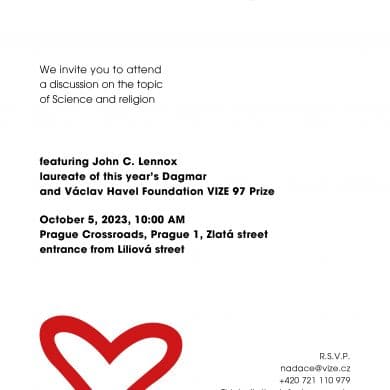The Dagmar and Václav Havel Foundation VIZE 97 Prize for Professor Stanislav Grof
The winner of this year’s VIZE 97 Foundation Prize is Professor Stanislav Grof, well-known psychologist and psychiatrist of Czech origin. In the forenoon debate with topic “The New Prospects in Psychiatry and Psychology”, he and his colleagues from the branch, together with the guests invited, discussed the opinions on the developments in psychiatry, and Mr Grof presented the results of his multiyear research, which he achieved by practising Holotropic Breathwork. In the afternoon award ceremony, Stanislav Grof received the Prize from Ms Dagmar Havlová, Chairwoman of the Board of Trustees, and President Václav Havel. In deep recognition and admiration of his work, the VIZE 97 Foundation awarded the Honorary Diploma and the Crutch of St. Vojtěch to him.
Professor Stanislav Grof, M.D., Ph.D. – biography
Professor Stanislav Grof (l931) was born in Prague, where he also studied medicine. He co-founded the Research Institute of Psychiatry, where he examined the effects of psychedelics on human psychics and the therapeutic use of LSD in the event of mental disease.
From January 1967, at the invitation of the Psychiatric Research Center of the J. Hopkins University, Baltimore (Maryland, USA), he continued his research work in the Untied States. In 1969 he became Chief of Psychiatric Research there, engaged in researching the changed states of consciousness, and Professor of Psychiatry at the J. Hopkins University. In 1972 he published his first book, entitled “Realms of the Human Unconscious”.
In 1972 he also became a scientific worker of the Esalen Institute in Big Sur, California. There he could summarise his existing knowledge and, with his wife Christina, create and develop Holotropic Breathwork. This method of the active auto-therapeutic changed state of consciousness allows reaching the unconscious area without using drugs, re-living its content, and, in the event of suppressed traumas, this can have easing, relieving and healing effects. It also allows an overlap into transcendent areas of human psychics.
As a psychotherapist and in an effort to overcome the behaviourism and the narrowly biological freudism, dominating at that time, Stanislav Grof sought deeper psychological implications of the process of human personality growing and maturing. Together with Abraham Maslow and Anthony Sutich (founders of the Humanistic Psychology Association), he realised that a highly important element was missing – the spiritual dimension of human psychics.
As early as 1968, S. Grof, A. Maslow and A. Sutich founded the Association for Transpersonal Psychology, which associated all of those who viewed the human existence in its wholeness, which comprises numerous inseparable conjunctions – subjective, societal, ecological and cosmic. Over the subsequent years, S. Grof’s theoretical work as well practical therapeutic results significantly contributed to the development and constitution of this modern area and to the overall shift in viewing the human psychics.
It is natural that transpersonal psychology soon started to be connected and mixed with other branches of science, with which it gradually created the background of the new scientific paradigm – the new scientific thought. Thus the International Transpersonal Association was established in late 1970’s, becoming an interdisciplinary scientific organisation and supporting the effort for formulating the holistic concept of human being and its relationship to the world and universe. This includes names such as Fritjof Capra, Werner Heisenberg, David Bohm, Gregory Bateson, Hazel Hendersenová, Karl Pribram, Alan Wats, Ralph Metzner, Ruppert Sheldrake, Ram Dass, Gabriela Roth, and more.



